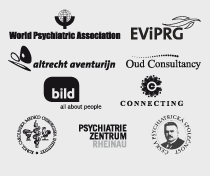Pre-Congress Workshops
Wednesday 19 October 2011
09.30 – 10.00 |
Registration |
10.00 – 13.30 |
Workshop 1 |
13.30 – 14.30 |
Lunch on your own |
14.00 – 14.30 |
Registration |
14.30 – 18.00 |
Workshop 2 |
14.30 – 18.00 |
Workshop 3 |
(1) The Short-Term Assessment of Risk and Treatability (START): measuring and managing risk in the short-term
Registration 09.30 – 10.00
Workshop from 10.00 – 13.30
|
|
Dr. Caroline Logan |
Dr. Michael Doyle |
Facilitators
Dr. Caroline Logan is a Consultant Forensic Clinical Psychologist in Greater Manchester West Mental Health NHS Foundation Trust and an Honorary Research Fellow in the Department of Community Based Medicine at the University of Manchester. She has worked as a researcher and a clinician in forensic services for fifteen years, working directly in both roles with clients who are at risk to themselves and others. She has also undertaken various consultancy roles with the multidisciplinary teams and the health and criminal justice organisations that look after and manage this client group, examining risk assessment and management practice and proposing and evaluating local and national change. She is both a clinical psychologist and a forensic psychologist, and she has a D.Phil in experimental psychology.
Dr Michael Doyle is currently in joint post of Clinical Researcher & Lecturer at the University of Manchester, and Nurse Consultant for Clinical Risk at North West Adult Forensic Services at Greater Manchester West NHS Trust. He is project manager for national study funded by National Institute of Health Care Research and Programme Director for recently developed MSc Forensic Mental Health at the University of Manchester. He is Treasurer for the International Association of Forensic Mental Health. Published widely on psychosocial risk assessment, formulation and management. Provides training, consultancy and advice to health, social care organizations and criminal justice agencies across the UK, Europe and beyond. Accredited as a Behavioural and Cognitive Psychotherapist and continues clinical practice, supervision and mentorship.
Abstract
A new assessment scheme: The Short-Term Assessment of Risk and Treatability (START) presents a workable method for assessing risks to self and others encountered in mentally and personality disordered clients. It’s a 20-item clinical guide for the dynamic assessment of seven risk domains (violence to others, suicide, self-harm, self-neglect, unauthorized absence, substance use, and victimization). The START represents a refinement in the assessment of dynamic risk factors in that it provides for the differential coding of both patient strengths and needs, while allowing for the recording of case-specific risk factors. The START is meant for interdisciplinary use and each of the 20 items is assessed according to succinct descriptions provided in the published manual. The START is intended for use with adults with mental, personality and substance related disorders. It is relevant to inpatient and community psychiatric, forensic, and correctional populations.

(2) European Association in Mental Health and Intellectual Disability (EAMHID) Guidelines for Assessment, Diagnostic and Treatment of Severe Problem Behaviour in Persons with Intellectual Disability
Registration 14.00 – 14.30
Workshop from 14.30 – 18.00
|
Prof. Anton Došen |
Facilitator
Prof. Anton Došen, psychiatrist/child psychiatrist, is emeritus professor of ”Psychiatric Aspects of Intellectual Disability” at the Radboud University, Nijmegen, the Netherlands. He served 10 years as the chairman of the Section on Psychiatry and Intellectual Disability of the World Psychiatric Association, and was the founder of The European Association for Mental Health in Mental Retardation. Currently he is honorary president of the Association. He is active in the dissemination of existing knowledge regarding professional help to people with mental health problems and intellectual disability by teaching through different courses, postgraduate seminars, symposia and congresses in different countries. In his publications he is in particular engaged with developmental perspective and integrative approach in assessment, diagnostic and treatment of psychiatric illness and behaviour problems among individuals with intellectual disability and autism. His methods of applying the developmental perspective and integrative approach is widely in use in the practice of professionals in the Netherlands and Belgium.
Abstract
Problem Behaviour (PB) in individuals with intellectual disability (ID), in particular aggression, is frequently discussed by professionals as this difficulty often represents a serious obstacle to the provision of care for this population. At present PB is viewed as a specific phenomenon with specific presentation form and onset mechanism. A group of internationally distinguished experts in this field, under leading of professor Dosen, developed the Guidelines for PB as an EAMHID (European Association for Mental Health in Intellectual Disability) document.
The main objective of the Guidelines is to supply a conceptual framework for the explanation and understanding of the phenomenon of PB in individuals with ID, with the goal of promoting an improved professional approach to the problem. In the workshop the emphasis will be on the developmental bio-psycho-social approach in assessment with the aim of differentiation of PB from a “normal but difficult” behaviour of a person with ID, on the one hand, and from a psychiatric disorder, on the other hand. The integrative diagnostics and a comprehensive integrative treatment approach of PB will be discussed on the base of case presentations.

(3) The Comprehensive Assessment of Psychopathic Personality (CAPP)
Registration 14.00 – 14.30
Workshop from 14.30 – 18.00
|
Prof. Stephen D. hart |
Facilitator
Stephen Hart is a Professor in the Department of Psychology and a Member of the Mental Health, Law, and Policy Institute at Simon Fraser University in Canada, and also a Visiting Professor in the Faculty of Psychology at the University of Bergen in Norway. Dr. Hart’s primary area of expertise is clinical-forensic psychology. Most of his work focuses on clinical-forensic assessment in criminal and civil settings, and especially on the assessment of violence risk and the assessment of psychopathic personality disorder. He is the author or co-author of more than 125 articles, chapters, and books. He has served as co-editor of the International Journal of Forensic Mental Health, and a member of the editorial boards of Behavioural Sciences and the Law, Criminal Justice and Behaviour, the Journal of Forensic Psychology Practice, the Journal of Personality Disorders, Law and Human Behaviour, and Legal and Criminological Psychology. He has served as President of the American Psychology-Law Society (Division 41 of the American Psychological Association) and a Director of the Canadian Association of Threat Assessment Professionals. Dr. Hart has conducted more than 200 training workshops for mental health, law enforcement, corrections, and legal professionals in North America, Europe, Asia, and Australasia. He has provided expert testimony in the superior courts of the provinces of Alberta, British Columbia, Manitoba, and Ontario; and in the states of Arizona, California, Florida, Illinois, Iowa, Kansas, Missouri, Texas, Washington, and Wisconsin. He has received several awards, including the Saleem Shah Award for Early Career Contributions to Psychology and Law, from the American Academy of Forensic Psychology and the American Psychology-Law Society, and the Career Contributions Award, from the Society of Clinical Psychology (Division 12 of the American Psychological Association).
Abstract
The Comprehensive Assessment of Psychopathic Personality (CAPP) has been developed to assess the symptoms of psychopathic personality disorder (PPD). Two important features distinguish the CAPP from other tests of PPD; it is comprehensive and it is dynamic. The CAPP covers the full domain of PPD symptomatology. This means the CAPP is potentially useful in a variety of settings (e.g., correctional, forensic psychiatric, civil psychiatric, community and family), rather than being optimized for use in a single setting. The CAPP can be used to assess the severity of symptoms over discrete time periods, in addition to lifetime severity. This means the CAPP is potentially useful when it is necessary to measure changes in the severity of symptoms over time (e.g., when studying their developmental course, response to treatment, reaction to situational changes or variation in relation to the course of an axis one disorder). At present it is unclear to what extent traits of personality disorder change over time (if at all) or why they might change, but it is impossible to answer these questions empirically without a test that is (theoretically) sensitive to change.
The CAPP has been developed by David Cooke, Stephen Hart, Caroline Logan and Christine Michie. This workshop will be led by Stephen Hart.
© Oud Consultancy - Amsterdam - The Netherlands





